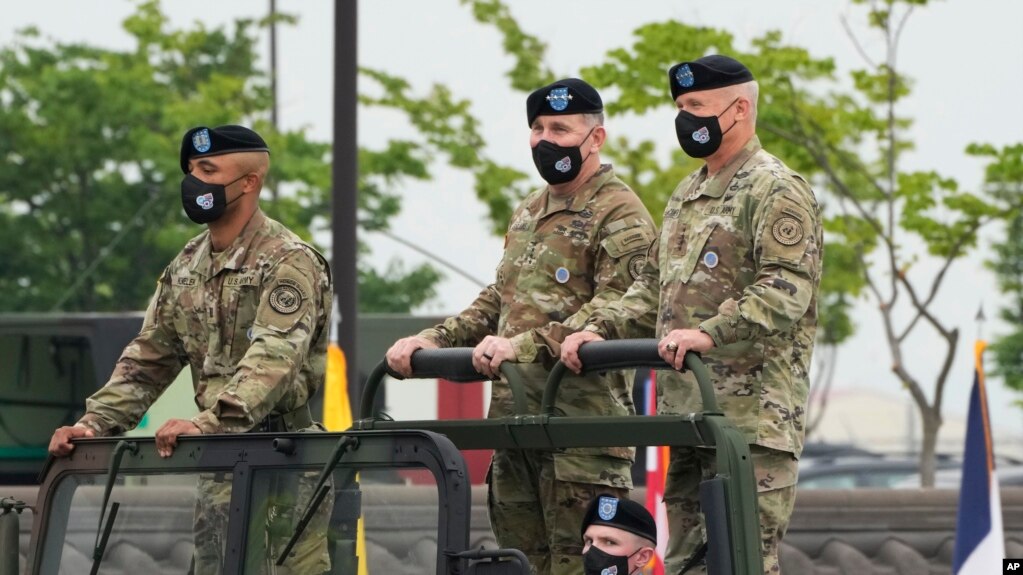
Mike Pence on Leadership and the Future of the Republican Party
Former US Vice President Mike Pence looks back on the events of January 6 2021, his final days in office with President Trump and his…
Thought Leader: Mike Pence

When developing a new war plan, the United States and South Korea should consider ways to counter China’s increasingly aggressive stance in Northeast Asia, a former commander of the U.S. Forces Korea (USFK) said.
General Robert Abrams, the commander of the U.S. Forces Korea (USFK) from 2018 to 2021, said in addition to threats from North Korea, Washington and Seoul should develop new operational war plans (OPLANs) that account for military aggression by Beijing, whose presence has “significantly increased” in the region since 2010.
Abrams made his remarks in a televised YouTube interview with VOA’s Korean Service that aired on December 25. He was discussing new strategic planning guidance (SPG) that U.S. Defense Secretary Lloyd Austin and South Korean Minister of Defense Suh Wook had approved for an update at their annual Security Consultative Meeting on December 2.
Countering China
Austin and Suh agreed to expand the allies’ military role in the region beyond North Korea to include “security cooperation in the Indo-Pacific and the world where mutual interests align” as encapsulated in a joint communique.
It is the first time Washington and Seoul have updated their war plan since 2010.
In the VOA Korean Service interview, Abrams said there has been “a 300% increase in the violation of the Korean air defense identification zone (KADIZ)” by Chinese military planes in the three years ending in 2021.
VOA’s Korean Service contacted the Chinese Embassy Washington, D.C., for comment but did not receive a response.
The KADIZ is a buffer between international air space and South Korean air space where incoming flights are required to identify themselves.
In December 2020 and November 2021, Chinese and Russian aircraft intruded on the KADIZ, prompting the South Korean military to respond with fighter jets on both occasions.
Backlash in Seoul
Abrams’ comments stirred controversy in Seoul, and the Ministry of National Defense criticized his remarks as “personal opinion” on December 27.
A source at the South Korean Ministry of National Defense who spoke to VOA’s Korean Service on Monday and asked to remain anonymous due to the sensitivity of the issue said Abrams’ remarks on Chinese threats related to SPG were “very surprising.”
The source said the purpose of the newly approved SPG is “to update war plans against North Korean threats.”
Pentagon spokesperson Lieutenant Colonel Martin Meiners told VOA on Monday the Defense Department “regularly conducts combined planning with” South Korea “on a range of security issues” that cannot be discussed in detail due “sensitive security matters.”
Military experts said Abrams’ remarks reflect the region’s changed security environment that emerged due to China’s increased military aggression, a change that must be incorporated in the new OPLANs.
Retired U.S. Army General James Thurman, the commander of USFK from 2011 to 2013, said, “At some point, we must understand the PRC’s [People’s Republic of China] intentions when you are conducting military planning, and you must plan for all conditions.”
Bruce Bennett, a senior defense analyst at the RAND Corporation, said the new OPLAN at “the very least” must include the possibility of a Chinese military intervention on the Korean Peninsula if the North Korean regime collapses or a war breaks out between the two Koreas.
David Maxwell, a senior fellow at the Foundation for Defense of Democracies, also said a war plan should include measures against Chinese aggression if crises break out on the peninsula.
Maxwell said, “The best way to deter conflict is to prepare for it and ensure China knows our alliance have the strategic resolve to protect all alliance partners.”
Impact on denuclearization effort
Some experts, however, questioned the idea of stating China’s threat in OPLANs.
Ken Gause, director of the Adversary Analytics Program at CNA, said Seoul will be reluctant to publicly acknowledge that Beijing’s threats should be incorporated in OPLANs as doing so would make it difficult for South Korea “to use China’s influence to engage North Korea.”
Seoul has been trying to forge inter-Korean activities, including peace efforts, even as North Korea continues to test its missiles.
South Korea’s Joint Chiefs of Staff said North Korea launched what appeared to be a ballistic missile, off its east coast, on Tuesday. It is Pyongyang’s second missile test of 2022.
Joseph DeTrani, who served as the special envoy for the six-party nuclear talks with North Korea, said the allies should discuss “all relevant military issues” and “whatever the decision, it should not have a negative impact on nuclear talks with Pyongyang.”
Harry Kazianis, senior director of Korean Studies at the Center for National Interest, said, “South Korea will be very wary about including China in any sort of war planning.”
Kazianis continued, “While surely Seoul is worried about Beijing’s long-term intentions, for now, not antagonizing China is a smart strategy” as China is South Korea’s “economic engine of growth for Seoul.”
Mike Pence on Leadership and the Future of the Republican Party
Former US Vice President Mike Pence looks back on the events of January 6 2021, his final days in office with President Trump and his…
Thought Leader: Mike Pence
Marc Short on U.S. Investment in Critical Minerals
Why do critical minerals matter now? Marc Short explains how U.S. investment in critical minerals fits into a broader strategy around economic security, manufacturing, and…
Thought Leader: Marc Short
Marc Short on AI Policy and the Government’s Role in Chip Technology Investment
On CNBC, Marc Short breaks down the role of AI policy and how government investment is shaping the future of chip technology. A former Chief…
Thought Leader: Marc Short

